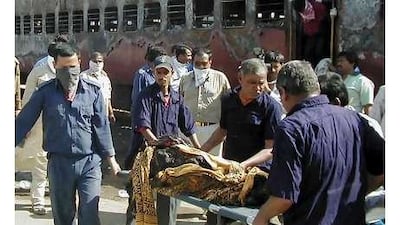KOLKATA // An inquiry commission report that last month said a 2002 train fire that killed 59 Hindu activists was result of a planned attack by Muslims has been termed by India's National Human Rights Commission (NHRC) a "partial report" because the government-constituted panel "had no independence in functioning".
The fire in a compartment of Sabarmati Express at the station of Godhra in western state of Gujarat triggered an anti-Muslim riot in which at least 2,000 people, mostly Muslims were killed. Four years after the fire, Justice JC Banerjee's Inquiry Commission, ordered by India's railway ministry, concluded that it was caused by an accident and not by any deliberate attack by Muslims. But, contradicting those findings, the Gujarat government-appointed Nanavati Commission said last month that, in a conspiracy, some Muslims poured petrol inside the compartment, locked all doors from outside and set it on fire.
Human rights groups sharply criticised the Nanavati report, prompting Justice S Rajendra Babu, the NHRC chairman, to say both Nanavati and Banerjee commissions presented partial reports because they could not go against the wishes of the respective governments that had appointed them. As Hindu activists targeted the Muslims across the state in revenge for the train fire, burning even women and children alive, media, human rights groups and rival political parties reported that that state's Hindu nationalist party of Bharatiya Janata Party (BJP)-led government supported the Hindu rioters and in some cases police herded Muslim victims into the hands of their Hindu killers.
Narendra Modi, the Gujarat chief minister, and his government faced international condemnation. When the Gujarat government instituted the inquiry commission, human rights groups said Mr Modi and his men were planting "fake witnesses" to help the commission prepare a report that would support the Muslim conspiracy theory. The Nanavati Commission said: "There is absolutely no evidence to show that either the chief minister [Narendra Modi] or any of the ministers in his council or police officers had played any role in [manipulating evidences in] the Godhra incident."
The Nanavati report also praised Mr Modi, other ministers and the police by noting that there was no lapse on their part in providing protection, relief and rehabilitation to all victims of the communal riots. The report said some Muslim men forced their into the compartment, poured 140 litres of petrol on the floor and lit, before running out and latching up all doors from outside - to prevent the Hindu passengers from escaping. The commission also said two local petrol pump employees testified before the commission that they had sold 140 litres of petrol to a group of Muslims who carried it in plastic jerry cans.
But Tarun J Tejpal, the editor-in-chief of the investigative weekly print magazine Tehelka, said the train fire was not the result of any premeditated ambush by the Muslims and key witnesses were bribed by police to frame some Muslims. In its six-month investigation on the train fire, Tehelka caught the two petrol pump employees changing their testimonies. On the day of the fire, the two employees said to police, they had not sold petrol to anyone in a jerry can. But one year later, the two told police that they sold the petrol to a group of six Muslims. Ranjitsingh Patel, one of the two employees, admitted that no loose petrol was sold to any Muslim. "[Nanavati Commission's chief investigating officer] Noel Parmar paid 100,000 rupees to me and my colleague to change our testimonies," he told a Tehelka undercover reporter.
Tehelka reporters also caught Murli Mulchandani, a local municipal executive, who witnessed the train fire in the Nanavati Commission report, saying that he was sleeping at home when the train caught fire. Mukul Sinha, an executive of Ahmedabad-based Jan Sagharsh Manch (People's Struggle Platform-JSM) said the Nanavati Commission report was a "pack of lies" fabricated to promote BJP's theory that all Muslims are terrorists, and to boost Mr Modi's political ambitions.
"The Hindu activists had no reservation for their train journey. It was impossible for the Muslims to know in advance that the activists would be on that particular train and to hatch a conspiracy," Mr Sinha said. "Police and the [Nanavati] commission reported that Muslims latched up all doors of the compartment from outside to prevent Hindus escaping from the burning compartment. It cannot be true because none of the doors of this type of compartment can be latched from outside. There are many such holes in this commission report.
"It's also difficult to believe that the Muslim men entered the compartment, poured the petrol, set the coach on fire and escaped without any fire injury." * The National
